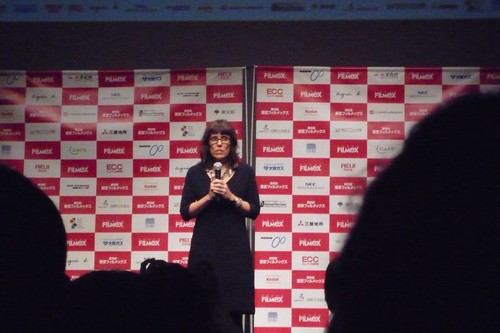
I've only seen two Walter Salles films, 1998's CENTRAL STATION and 2004's THE MOTORCYCLE DIARIES, (I'm discounting the short films he did for PARIS JE'TAIME and CHACUN SON CINEMA, but I like his segment for the latter) I enjoyed the former, but I preferred the latter. Walter Salles also had a hand in producing one of my all-time favourite films, Fernando Mereilles' CITY OF GOD.
This film, LINHA DE PASSE, the opening film of TOKYO FILMeX, is a collaboration between Salles and long-time collaborator Daniela Thomas (she was co-director for most of Salles' pre-CENTRAL STATIOn films). She was there to present the film and also for the Q and A session.

LINHA DE PASSE is what some may call a 'slice of life' film, it's about a housekeeper Cleuza (Sandra Corveloni, winner for Best Actress at this year's Cannes Film Festival) and her four sons (all from different fathers): Dênis (João Baldasserini), a motorcycle courier trying to help raise his infant son (he's separated from the baby's mother), Dinho (José Geraldo Rodrigues), a gas station attendant who is trying to seek purity in body and soul through Christianity because of a hinted troubled past, Dario (Vinícius de Oliveira, I was shocked to find out only later through the Q and A session that he was the kid from Central Market) who realizes that he may be getting too old for football tryouts and Reginaldo (Kaique Jesus Santos), whose black skin makes him feel like an outsider even in his own family.
The family live at the outskirts of São Paulo, and the film is really about all of them struggling to live a better life in a big oppressive city. When explaining about the title, LINHA DE PASSE, Daniela Thomas said that it's a children's game played by four people where they have to kick the ball back and forth without letting it drop onto the ground. Which is pretty much the metaphor of this film, as the four siblings are supposed to stay in the game, striving to be respectable members of the society. For the likes of Dario and Dinho, the only way out is football or religion, while young Reginaldo tries to take every single bus in the city to find his real father (the only thing he knows about him is that he's a bus driver), while Dênis faces a moral and ethical dilemma when is given a chance to make more money by committing some petty crime.
It's cliched to remark that the location and settings of the film are almost like a character of their own. But that's really the case, film is actually feels more complex now that I'm thinking of it, as compared to what I thought when I just got out of the cinema. Some social issues and everyday problems are subtly touched upon without being too heavy-handed and preachy. And it probably means more to a viewer when he or she has done more research on Sao Paolo.
The film mostly intercuts between each character's storyline, and apparently, they are mostly based on real-life incidents. It's also very engaging to watch.
Initially, I was most interested in following Dario and Reginaldo's storylines (which are actually quite conventional in their premise, but unexpected in their execution), since I'm curious to see whether Dario can get accepted in a football team, or how Reginaldo's gonna find his father, but I gradually start to like Dinho's storyline a lot as well.
The cinematography's top-notch, alternating between handheld and well-composed static shots, editing's very rhythmic, and acting's wonderful. Except for Vinícius de Oliveira, all cast members were making their feature film debut. When Daniela Thomas was asked why they made a choice to use non-professionals and amateurs, I figured out that the filmmakers probably wanted to preserve the authenticity, since that's mostly what independent Malaysian films go for as well, but another reasoning made a lot of sense. Daniela Thomas said that because they had a very mobile crew, and were doing shooting the film guerrilla-style at public areas, it would be unwise to have a very recognizable face that could attract too much attention.
The film took four years to develop, and it was built around Vinícius de Oliveira, who actually went to football school for four years to prepare himself for the role. And of course, they also wanted to find co-stars who share some facial resemblances with him so that they are believable as siblings. Definitely neo-realism. The subplots of the story gradually builds up towards an ambiguous, open-ended 'Life goes on' ending. As the film was nearing its end, I started figuring out which direction it was heading and was a little surprised. But then, I knew it was impossible to tie up all loose ends without sacrificing the realism of the film, and besides, the last 10 minutes are so haunting and poetic that I felt there really weren't any better ways to end it. In fact, I think this film has one hell of an ending!
Daniela Thomas said that the open-ended ending has more to do with her influence, which I believe, since Walter Salles' own films, THE MOTORCYCLE DIARIES and CENTRAL MARKET, try to provide tidier resolutions in their endings.
UK trailer of Linha de Passe... makes the film seem more sentimental than it really is. Film doesn't have an overwhelming orchestral score like this
This original trailer is better at capturing the film's actual spirit, though still pretty emo compared to the original film, ah well, you gotta do whatever it takes to attract audiences, yeah?
Tags: